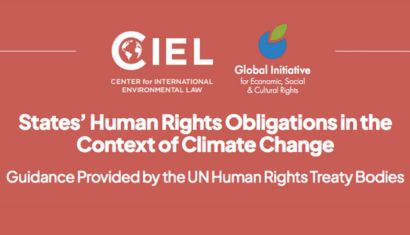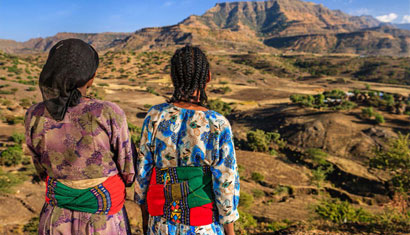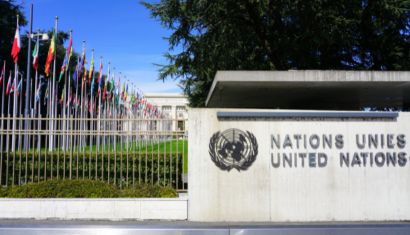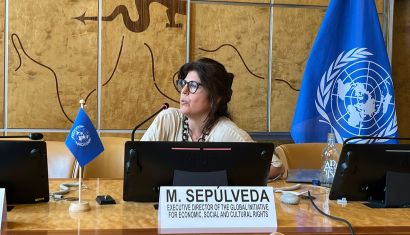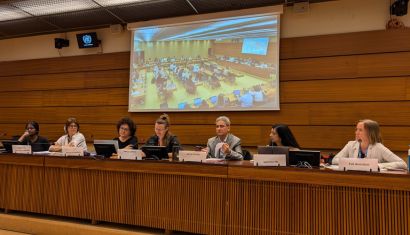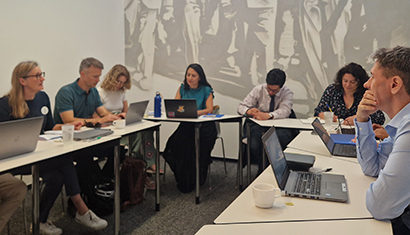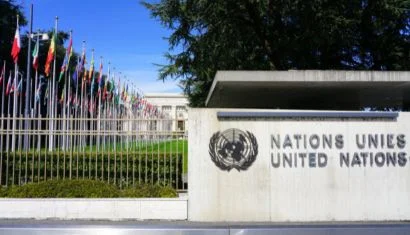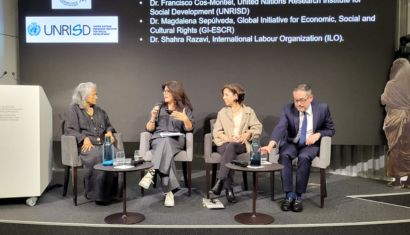On 21 June, our Executive Director, Magdalena Sepúlveda, participated in the 56th session of the Human Rights Council at a side event on “Summit of the Future? Civil Society Must Reclaim the United Nations.” The event was co-sponsored with Rosa Luxembourg Stiftung, FIAN International, CETIM, the Society for International Development, and Geneva Global Health Hub, among other organisations.
The panel composed by Rini Elizabath Babu (Geneva Graduate Institute's Applied Research Project Team), Melik Özden represents (CETIM, Centre Europe), Nicoletta Dentico (Society for International Development and the Geneva Global Health Hub-G2H2), Maithili Pai (International Service for Human Rights-ISHR), and our Executive Director, Magdalena Sepúlveda, discussed how civil society participation has been limited in the “Summit of the Future” processes. Against the backdrop of a trust and cooperation crisis in multilateralism and the weakening of intergovernmental coordination mechanisms, civil society organisations are raising the alarm.
For more information on the side event, you can read here:
For more related information, read our Op-Ed: Corporate Capture of the Future: A Threat to Stop.
On 6 June, GI-ESCR representatives met with Elisa Morgera, UN Special Rapporteur on human rights and climate change, and Astrid Puentes, UN Special Rapporteur on the right to a clean, healthy and sustainable environment.
At the meeting, which took place at the Maison Internationale des Associations (MIA) in Geneva, GI-ESCR learned about the priorities and vision of the two newly appointed mandate holders and submitted to them GI-ESCR concerns and recommendations for the delivery of these two critical mandates, which address the multiple environmental crises that are putting at risk the full range of internationally recognised human rights.
At the meeting, GI-ESCR’s representatives brought attention to the risks and opportunities arising from the intersection between climate, economic and social justice. GI-ESCR recommended both mandates to tackle questions related to socio-economic inequalities and the realisation of economic, social and cultural rights as a key priority to address the root causes of environmental degradation.
GI-ESCR highlighted that this includes the transformation of tax policies to foster the redistribution of wealth and the investment in climate mitigation and adaptation, combating privatisation of natural resources and public services, supporting recognising the care economy, investing in renewable energy systems that provide energy for all, measuring social and economic progress with indicators that go beyond GDP growth, among many other efforts, that allow placing human rights at the centre of economic policy. We underscored that this is key to generating well-being conditions for all without overshooting the capacities of our ecosystems.
Furthermore, we considered that to achieve this economy-wide transformation, the concept of a just transition provides a comprehensive framework to embed social and economic justice in climate and broader environmental policies. Born from the labour movement of the 1970s, the concept and social movements on just transition seek to ensure environmental protection is advanced through democratic means and contribute to the realisation of human rights.
We invited the Special Rapporteurs to explore the potential of just transition approaches to debunk harmful myths that hinder the implementation of environmental commitments, such as the belief that poverty eradication and combating inequalities are incompatible with environmental protection or that climate action obstructs development and realisation of economic, social and cultural rights and to provide policy recommendations that create synergies between climate, economic and social concerns.
Along these lines, GI-ESCR specifically encouraged Special Rapporteurs to champion and take an active role in the open global discussions on international taxation at the United Nations and at the regional levels to ascertain that the public revenue generated through cooperation on progressive and green tax policies is effectively allocated to tackle the climate emergency and to achieve a just transition to sustainable societies.
Considering the scale, speed and scope of the systemic change required to achieve emissions reductions and transformative adaptation to climate change, emphasised that these can only be possible through an unprecedented mobilisation of resources. According to some estimations, annual climate finance flows must increase by at least sixfold compared to current levels, reaching USD 8.5 trillion per year between now and 2030 and over USD 10 trillion per year from 2031 to 2050 if we are to achieve the 1.5°C target as set out in the Paris Agreement and avoid the most catastrophic effects of the climate emergency. These resources should be obtained, among other things, from progressive and green tax policies to ensure that those who contribute the most are the ones who pay to redress the climate emergency.
The statement included below, highlights crucial intersections between climate finance and economic justice, particularly in the context of the ongoing negotiations for a United Nations Framework Convention on International Tax Cooperation and the Regional Platform for Tax Cooperation for Latin America and the Caribbean (PTLAC).
The following statement, from our recent meeting with the Special Rapporteurs on the Right to a Clean, Healthy and Sustainable Environment, and on Climate Change and Human Rights, underscores the importance of integrating economic and social justice into environmental policies through the concept of a just transition.
We contributed with input to the study on “Women’s active, free and meaningful participation in development, with emphasis on decision-making” by the Expert Mechanism on Development.
The input provided underscores that to fully address women’s participation in development, the Expert Mechanism must consider their involvement in the energy transition. The presentation highlighted that, given the relevance of the energy transition to the fulfillment of the right to development, it is vital that women have a say, are heard, and take part in decisions related to the transition to be able to drive the processes for their development.
The submission addresses the fundamental importance of the energy transition for development. In that sense, it underscores that climate change has become a significant threat to the right to development and, thus, to fulfill this right, States must take urgent measures to address the climate crisis. In particular, States should transition away from fossil fuels and ensure sustainable and equitable access to energy resources. Besides, the submission emphasised that such global transformation must advance just and equitable outcomes. Participatory frameworks that include and empower women must be established in all energy transition processes.
The presentation also underlines the historical barriers that women faced and continue to face that restrict their possibilities to participate in public affairs and decision-making meaningfully. Specifically, it highlights how prevalent those barriers are in the energy sector. In that sense, the presentation stresses the need to take measures to ascertain the participation of women in all their diversity as users, producers, and leaders of the transition to renewable energy and set the path toward the fulfillment of the right to development.
Lastly, the presentation urges the Mechanism to establish a framework to ascertain women’s participation in the energy transition to fulfill their right to development. The presentation recommended a series of measures to be implemented by States and stakeholders, setting standards to operationalise effective, meaningful, and empowering participation for women.
With this contribution, we continue to advocate for efforts toward U.N. mandates that push for a fair and sustainable transition that addresses gender disparities.
You can read the presentation here:
Along with Campaña Latinoamericana por el Derecho a la Educación (CLADE) and the Right to Education Initiative (RTE), we have collectively submitted a joint contribution to the Special Rapporteur on the Right to Education. This submission aims to contribute to the Special Rapporteur's study on the human rights-based use of artificial intelligence in education.
The submission, drafted in Spanish, addresses question 9 concerning the challenges of implementing AI in education. Additionally, it offers insights relevant to questions 2d, 2e, 3, and 4. While not exhaustive, our submission aims to highlight critical challenges observed across different regions.
Key Highlights of the Submission:
• The joint submission emphasises the need for a human rights-based approach to integrating artificial intelligence in educational settings. It underscores the importance of incorporating human rights and ethical considerations throughout developing and implementing AI technologies in education.
• One of the primary concerns raised in the submission is the commercialisation of education facilitated by the push by commercial private actors for the use of artificial intelligence in education. It warns against the potential erosion of education as a human right and public good. It cites examples of how AI technologies have empowered powerful private actors and exacerbated educational system inequalities.
• The submission also addresses the risks associated with amplifying inequalities within national education systems between privileged and underprivileged students and among different countries. It emphasises the need for regulatory measures to address these risks and ensure that AI technologies contribute to bridging educational gaps rather than widening them.
• Recommendations are provided for policymakers and stakeholders to effectively address the challenges posed by artificial intelligence in education. These include developing and implementing robust regulatory frameworks, the promotion of transparency and accountability in the use of AI technologies, and the prioritisation of evidence-based policymaking.
Overall, the joint submission underscores the importance of adopting a human rights-based approach to integrating artificial intelligence into education. It calls for concerted efforts to address the challenges identified and ensure that AI technologies enhance, rather than undermine, the right to education for all.
For further details, you can read the joint submission here:
On 23 May, in honour of the esteemed contribution of work by Naila Kabeer to the fields of international development and feminist economics, our ED Magdalena Sepúlveda was invited by the United Nations Research Institute for Social Development (UNRISD) to participate in the event 'Conversations with Naila Kabeer: Reversed Realities and Feminist Economic Strategies for Today's World'.
Naila Kabeer discussed her influential work 'Reversed Realities', which examines how mainstream economic policies often overlook women's experiences.
The conversation also focused on the need for economic policies that address systemic inequalities.
These discussions are essential for advancing gender-just economic reforms and ensuring women's voices are central to policy-making.
Welcome remarks
Claire Somerville, Executive Director, Gender Centre, the Geneva Graduate Institute
Opening remarks
Caroline Dommen, Managing Director, IAFFE
Discussants
Shahra Razavi, Director of the Social Protection Department, ILO
Magdalena Sepúlveda, Executive Director, GI-ESCR
Closing remarks
Francisco Cos-Montiel, Senior Research Coordinator, Gender Justice and Development Programme, UNRISD

